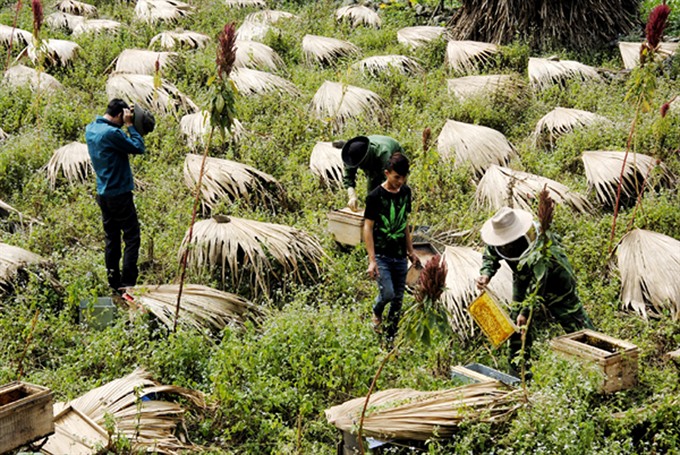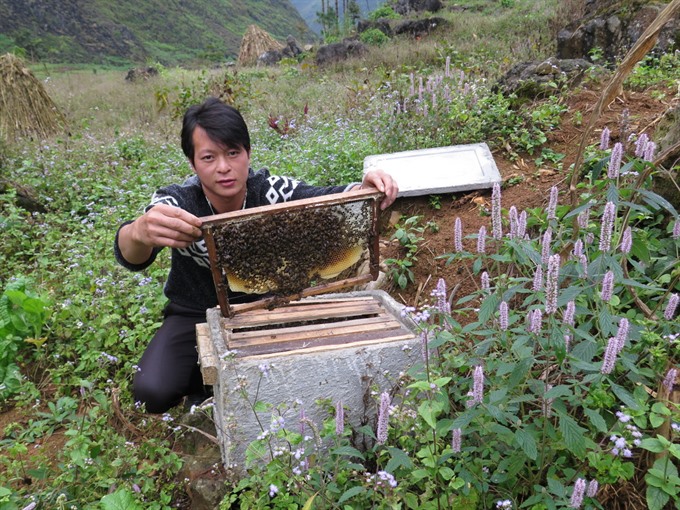 Society
Society

Last month, Lê Tiến Tuân, a beekeeper from the northern province of Tuyên Quang, moved 320 foreign beehives into local gardens in two villages of Thài Phìn Tùng Commune, Hà Giang Province, as per an unwritten agreement with gardens’ owners – which should have transpired fuss-less.
 |
| Workers of Tuấn Dũng Co-operative collect honey from beehives in Há Pống Cáy Village in Hà Giang Province. - Photo baohagiang.vn |
HÀ GIANG – Last month, Lê Tiến Tuân, a beekeeper from the northern province of Tuyên Quang, moved 320 foreign beehives into local gardens in two villages of Thài Phìn Tùng Commune, Hà Giang Province, as per an unwritten agreement with gardens’ owners – which should have transpired fuss-less.
But the following day, local authorities demanded that Tuân move all his beehives out of the commune before 8:00pm the same day. However, he didn’t comply, insisting that his actions were fully legal by state law.
Commotion broke out in the morning two days later, when villagers removed all of his beehives and deposited them 700m from the National Road 4C. Some even deliberately kicked over the bee boxes.
Such forceful removal of ‘foreign’ beehives, and by implication, beekeepers from other provinces, involving the provincial police and other law enforcement, under the auspices of higher-ups, in addition to arbitrary official decisions, are condemned by many in the know as violating various laws.
Previously, on September 19, Đồng Văn District People’s Committee issued a document, stating that all beekeepers can transport bees into the district only after they’ve received written permission from the committee. They also require beekeepers to register for temporary stay, however, local police refuse to grant such papers for beekeepers, a VTV report states.
Only 300ha out of 1,500ha of honey mint – endemic to the Đồng Văn Stone Plateau – can be used in honey production, thus the 7,700 native beehives of local people will be prioritised, Dinh Chí Thành, Deputy Chairman of the People’s Committee, explained the rationale behind such barricades to the Dân Việt newspaper.
Local beekeepers, like Vàng Mí Vàng, are concerned that their mint honey products may suffer in quality and quantity, “since foreign bees are larger, stronger, they overpower native bees and collect the already dwindling mint’s nectar, they may even kill native bees,” possibly leading to a collapse of native honeybee colonies.
Hà Giang’s mint honey was known for its remarkable quality and at certain times, can fetch a million đồng per litre. In 2013, the National Office of Intellectual Property granted a Mèo Vạc Geographical Indication (GI) for the mint honey product made in four districts of Hà Giang, namely Đồng Văn, Mèo Vạc, Yên Minh, and Quản Bạ.
Citing the protection of GI status, later that year, the provincial Department of Agriculture and Rural Development issued document No 1065 requiring authorities of the four districts to redouble their efforts in inspection and surveillance, and the prevention of any unregistered beehives from entering the localities.
Local arbitrary decision trumped state law?
In 2015, the Ministry of Agriculture and Rural Development (MARD) released Circular No 25 that aims to boost honey production by allowing the foreign bee – including the Italian variety – in commercial exploitation.
Yet, Hà Giang hasn’t annulled document No 1065, and later even released another document No 3405 requiring beekeepers to obtain written approval from the local People’s Committee before moving beehives into localities in the province.
Nearing the end of 2016, the province’s non-compliance has caused tremendous difficulties for beekeepers from other provinces.
Phạm Thị Hà, Deputy Director of Hà Giang’s Department of Agriculture and Rural Development, claimed that mint honey is granted GI, hence the locals must benefit from honey mint shrubs that grow only in this area; people from outside with foreign bees coming in freely and taking away the nectar will complicate their GI management. She also cited Article 7 under the Intellectual Property law as a basis to restrain inflow of foreign bees.
However, Phạm Vũ Khánh Toàn, Director of the Phạm & Partners law firm, pointed out two critical flaws in this rationale. First, they are confusing trademark and GI; specifically, registered trademark owners (i.e. businesses) benefit from exclusive rights, however, GI is common property available to all Vietnamese citizens, not an exclusive property of a certain province. Second, the cited Article 7, which puts limitations on IP rights to prevent abuse, is not relevant to the matter at hand.
Việt Nam News tried to contact Hà and Sơn for comments but was unable to.
 |
| A H’mong beekeeper in the Mèo Vạc District checks up on his native beehive in the middle of a mint flower field, Hà Giang Province. - Photo tuoitre.vn |
The advantages of foreign bees
The so-called ‘foreign bees’ were actually domesticated and have been considered ‘native’.
“The ‘foreign’ bee species we are raising was imported from Italy way back in 1967. After several decades of breeding, this Italian breed was allowed in commercial honey production as per Circular No 25,” Nguyễn Ngọc Chiến, Deputy Chairman of the Phong Thổ Beekeeping Cooperative in Tuyên Quang Province, said.
Therefore, nation-wide, foreign bees currently account for the large majority – 1.2 million colonies, or 80 per cent - out of the total number of 1.5 million.
According to Phạm Thanh Xuân, Director of Thanh Xuân Mountain Bee Development Co Ltd, the Italian variety is “larger, more resistant to diseases, having lower swarming tendency, yielding higher output, coping better with stress during the hive moving process, and suitable for commercial exploitation,” while the native ones are a wild species and yield less output.
Phạm Minh Dương, a beekeeper from Bình Dương Province said, with foreign bees, in ideal conditions, honey can be extracted from combs every 2-3 days, while with native ones, it’s once every ten days to a month.
Where the local beekeepers stand
Nguyễn Văn Trọng, Deputy Director of the Livestock Department, said that beekeeping is ‘nomadic’ in nature, hives must be relocated to where flowers blossom for the bees to draw nectar, and beekeepers will hire gardens from local people. However, the number of flowers is limited, leading to unbalanced interests between local and ‘outside’ beekeepers, causing conflicts.
Hà Giang’s authorities did support local beekeepers of native bees in terms of finance, facilitating their bank loaning with a zero per cent rate in first two years.
The mint’s season starts in two months’ time but allocation for beehives have been claimed, mostly by local beekeepers with native bees. It’s “nearly impossible” for foreign ones to get in, said Dinh Chí Thành, Deputy Chairman of the provincial People’s Committee.
Coupled with provincial protectionist regulations, it aims to boost local honey production as a means to lift ethnic people out of poverty in mountainous areas.
But the case of Lý Sáng Dèn, an ethnic beekeeper in Quản Bạ Commune, challenges the effectiveness of such measures. With VNĐ50 million (US$2,300) borrowed from the bank and VNĐ40 million of his own, Dèn bought 90 beehives. Four months later, the empty bee boxes piled up in his storage, since the bees have either flew away or died during cold weather.
He said he received no training on beekeeping, even though the provincial department of agriculture said they organise some 2,000 training classes per year.
A reasonable ban needed
Đinh Quyết Tâm, head of the Việt Nam Apiculture Association (VAA), said that in October, VAA and MARD conducted a field trip to Hà Giang Province, and saw that some foreign beehives are “without owners”, and they are “worried that not only foreign bees will dominate native bees in collecting nectar, but also that counterfeit products might be falsely labelled as ‘Mèo Vạc mint honey’ and pose a threat to genuine local products.”
However, he is of the opinion that “the ban must be based on rational justifications, or it will create an undesirable precedent of protectionism.”
The Department of Livestock (under MARD) issued Dispatch No 1566 on October 17, clearly stating that the honey quality is dependent on the flowers’ nectar rather on bee species, and asking all beekeepers to follow existing regulations, including the Law on Standards, Law on Biodiversity, and Circular No 25.
The department also urged Hà Giang’s authorities to be proactive in building a local standard for honey bees and honey products, offering guidance to businesses, and developing conservation programmes for specific native species.
Official regulations on apiculture are expected to be released in 1-2 years. – VNS




